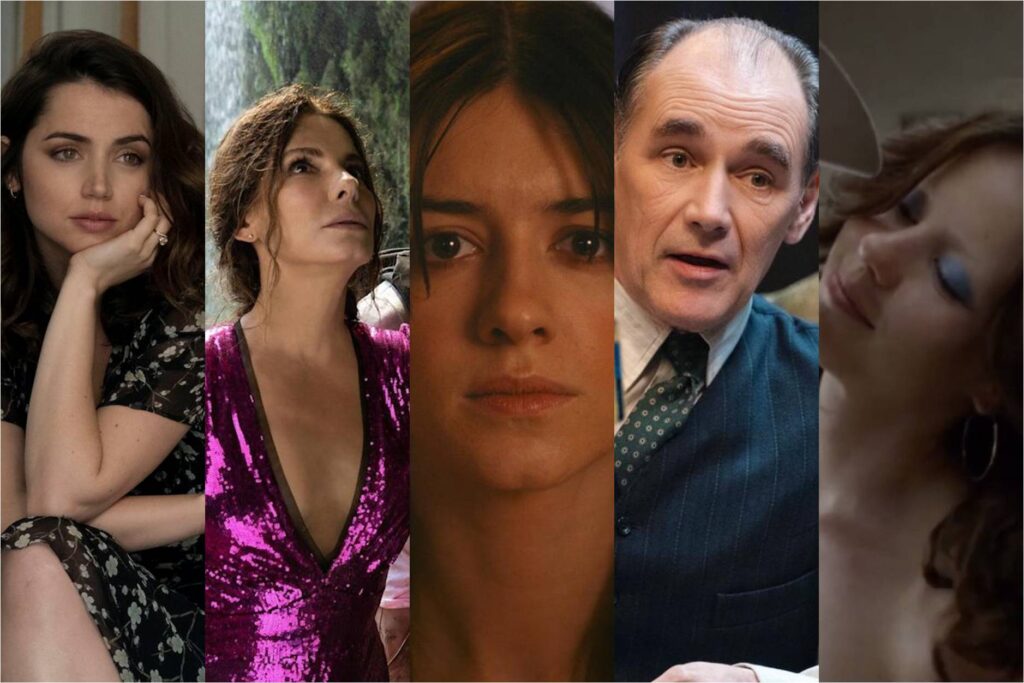
When it comes to modern movies, there are now two Americas. The first is a land of franchise dominance and corporate hegemony, where superhero flicks and sequels rule the multiplex. Even for fans of costumed entertainment—and I generally count myself among their number—surveying the box-office landscape can yield a dispiriting and homogenous view. The 10 highest-grossing films of 2019 were all based on existing IP, with seven hailing from the Walt Disney Company and an eighth (Spider-Man: Far from Home) that’s fully enmeshed within the Marvel Cinematic Universe, i.e., the Mouse House’s flagship franchise; zoom out to the top 15, and only two pictures (Us and Knives Out) were truly original creations. The COVID-19 pandemic aggressively accelerated this trend, and while cautious audiences may finally be returning to theaters, they only really pack the place for familiar properties. The mushrooming sprawl of these four-quadrant productions—competently made, ruthlessly merchandised, exceedingly familiar, rigorously safe—has inspired many industry experts to lament the death of cinema.
Maybe they’re right. After all, as the collective conception of a box-office hit perpetually narrows in scope and variety, it’s difficult to imagine studios routinely green-lighting risky original projects. And yet! I am once again compelled to repel these dire predictions, because there lurks beneath this marketplace of non-ideas a second America—one where original movies keep getting made, and in different shapes, sizes, and styles. Last month alone saw the release of at least five new films that are noteworthy for their strangeness, their pluck, their originality. Forget recycled superhero stories; these are movies with genuine concepts.
None of them is perfect; in fact, I’m not sure that any will appear on my year-end top 10. But what matters less than their individual quality is their collective individuality. They possess ideas and storylines and imaginations that extend beyond the commercial imperative—the reflexive obligation to churn out another installment of a popular series simply because the last one made money. An intriguing concept doesn’t automatically result in a good movie, but it does (or should) serve to forestall the prophecies of cinema’s impending doom.

Consider The Lost City (aka The Star-Driven Comedy), a goofy adventure in which Sandra Bullock and Channing Tatum play a romance novelist and her, uh, cover model who become embroiled in a frenetic race for a precious relic on a jungly island in the Atlantic. As conceits go, this is hardly novel; it’s basically a riff on Romancing the Stone, which itself was a riff on Raiders of the Lost Ark (which was an homage to the ancient serials, and so on). But the film’s very framework—the theory that contemporary audiences will buy tickets to see two sexy movie stars trade looks and fling barbs—is irresistible. I hope The Lost City makes a billion dollars—not because I want to see a sequel to The Lost City, but because I want to watch superior examples of its blueprint.
The version that the filmmakers have supplied here—the directors are Aaron and Adam Nee, who co-wrote the script with Oren Uziel and Dana Fox—doesn’t fully capitalize on its enormously appealing premise. Bullock and Tatum exhibit a playful repartee, but much of their dialogue has a lumpy, improv-heavy feel, and their sexiness doesn’t translate to actual heat; this is the kind of picture where the first kiss takes place during the last scene. The plot is agreeably implausible (I am admittedly unacquainted with harlequin romances, but I am skeptical that the men who pose for book covers are celebrities, even if they look like Channing Tatum), but the action is clearly an afterthought, with little concern for visual dynamism or wit.
And yet, The Lost City is enjoyable for reasons beyond its mere existence. Bullock and Tatum really are warm together, and if the material is beneath both of their talents, they elevate it rather than sinking to meet it; a sequence where she gingerly pulls leeches from his back nimbly straddles the line between embarassment and excitement, while a scene where she narrates in baroque prose while applying an eczema cream to his skin is legitimately touching. (Bullock also spends most of the movie wearing a ludicrous magenta-glitter jumpsuit, and needless to say, she wears it well.) Daniel Radcliffe is smartly cast as the effete villain, while Brad Pitt is hilarious in a cameo as a Jason Bourne parody with a luxuriant blond mane. The crestfallen look on Tatum’s face when Pitt’s character steals his gallant thunder deserves its own mini-franchise.
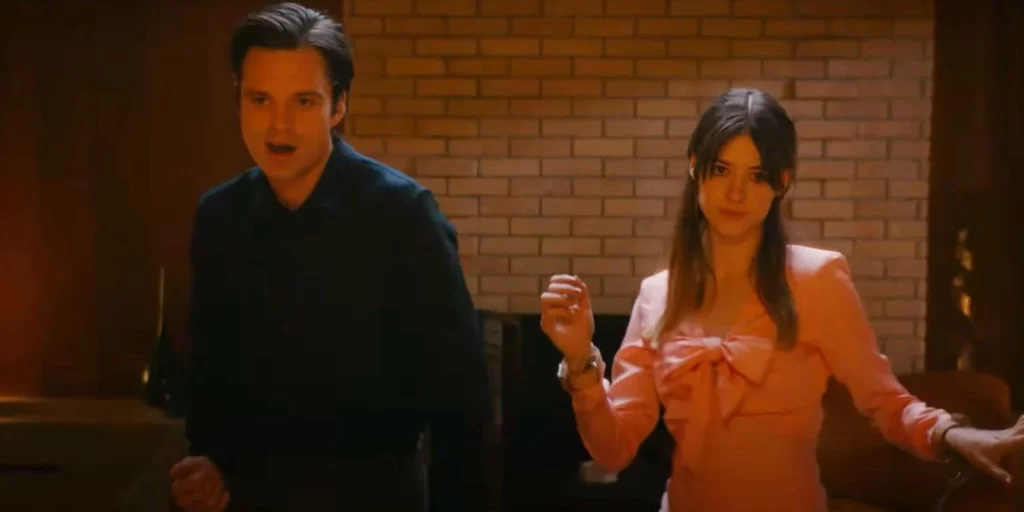
The romantic-comedy genre receives an entirely different spin in Fresh (aka The Gearshift Flick), the bold and intriguing feature debut from Mimi Cave. For its first half-hour, it unfolds as a perceptive, somewhat jaded portrait of the modern dating scene. It centers on Noa (Normal People’s Daisy Edgar-Jones), a disenchanted designer who seems ready to give up on men altogether, especially after she endures a spectacularly awful first date with a guy who provides cheerful suggestions on how she might upgrade her wardrobe. (Also, she should smile more!) Fate changes her mind when she runs into Steve (a terrific Sebastian Stan), a gorgeous and conveniently available prospect armed with a strong jawline, a warm sense of humor, and not a single backhanded compliment. Their sizzling chemistry hints at a familiar but pleasant type of picture—a love story in the social-media age, with its associated connections and anxieties—only for the screenplay (by Lauryn Kahn) to suddenly and dramatically pivot, at which point a title card finally appears on screen and Fresh becomes a different movie entirely.
It’s dangerous to reveal too much about Fresh—partly because it’s best to experience its careening tonal and narrative shifts as cold as possible, and partly because divulging its suspenseful setup (which crudely reduces to this movie, but with women) risks making it sound more electric than it is. Cave has a fine eye for detail—close-ups of characters slowly placing meat into their mouths are delectably grotesque—but she’s less assured when it comes to set pieces; as the film grows increasingly frenzied, it devolves into sloppiness and repetition.
Still, Fresh is (forgive me) appetizing viewing, and not just for its thematic topicality about commodified women. There’s also just something exciting about watching a movie and having no idea where it’s going; beyond general notions of twist-and-turn unpredictability, there’s the sense that new and exotic ideas are at work here. Also at work, and enjoying his job, is Stan, who delivers a wolfishly entertaining performance as a too-good-to-be-true catch whose gleeful amorality doesn’t entirely erode his inner sincerity. When he tells Noa he likes her, you can tell he means it, even if you can’t wait for him to receive his just desserts.
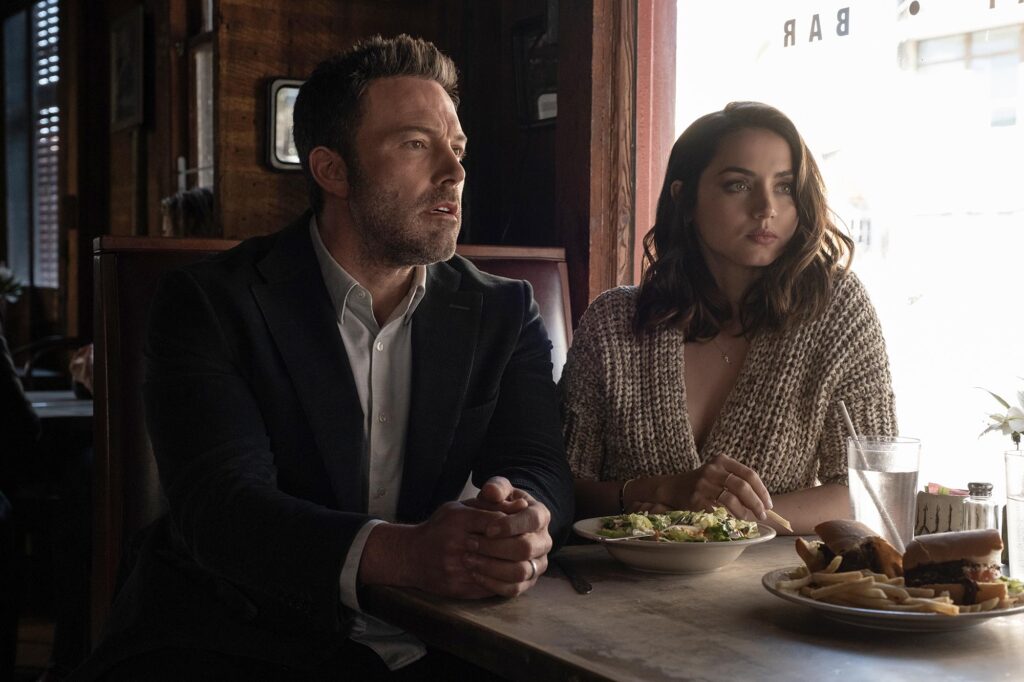
The romance at the center of Deep Water (aka The Erotic Thriller) is far less explosive, though it carries some shocks of its own. The tale of an unhappily married couple, Vic (Ben Affleck) and Melinda (Ana de Armas), it’s a sordid study of matrimony, infidelity, depravity, and sensuality. In other words, it’s a film by Adrian Lyne, the provocateur who spent the early decades of his career—in pictures like 9 1/2 Weeks, Fatal Attraction, and Indecent Proposal—exploring the cracks of love and the dangers of lust, in ways designed to both excite and unnerve audiences. The pleasure of Deep Water, which is Lyne’s first film since Unfaithful 20 years ago, lies in its unapologetic trashiness—the way it uses its putatively grown-up characters as a bridge for delivering nigh-childish melodrama.
That Deep Water is a proudly mature movie—a motion picture for adults, by adults, and featuring (in the lexicon of premium-cable networks) adult content—doesn’t mean it’s especially sophisticated. Its plot, which focuses on Vic’s mounting despair as Melinda shamelessly (or defiantly) flaunts her extramarital affairs, is overheated, and while its screenplay (by Zach Helm and Euphoria’s Sam Levinson, adapting a Patricia Highsmith novel) gestures toward an honest interrogation of modern sexual mores, it never properly develops its characters; that’s particularly true of Melinda, who despite de Armas’ best efforts comes off less as a fascinating enigma than a capricious tramp. (For all the buzz about the film’s steamy sex scenes, its most memorably filthy moment arrives when Melinda daintily plucks a pubic hair from her mouth.) And the third act, with its bloody stones and frantic chases and stubbornly floating corpses, is fun but ridiculous.
But again, that heightened quality is part of the movie’s appeal. Lyne plays lurid material straight, and it’s rewarding to follow a story about a marriage that’s complex and intense, even if its contours are unpersuasive. Affleck, supplying a darker variation on the emasculated husband he played in Gone Girl, easily draws you inside his tangled thicket of emotions; Vic is by turns sad, friendly, helpless, and scary, and while the character may seem inconsistent, the actor makes his messiness convincing. Scenes of Vic politely chatting with Melinda’s lovers, in a modulated tone that’s simultaneously amiable and sinister, are thrilling in their tension, satisfying an itch I didn’t even realize needed to be scratched.
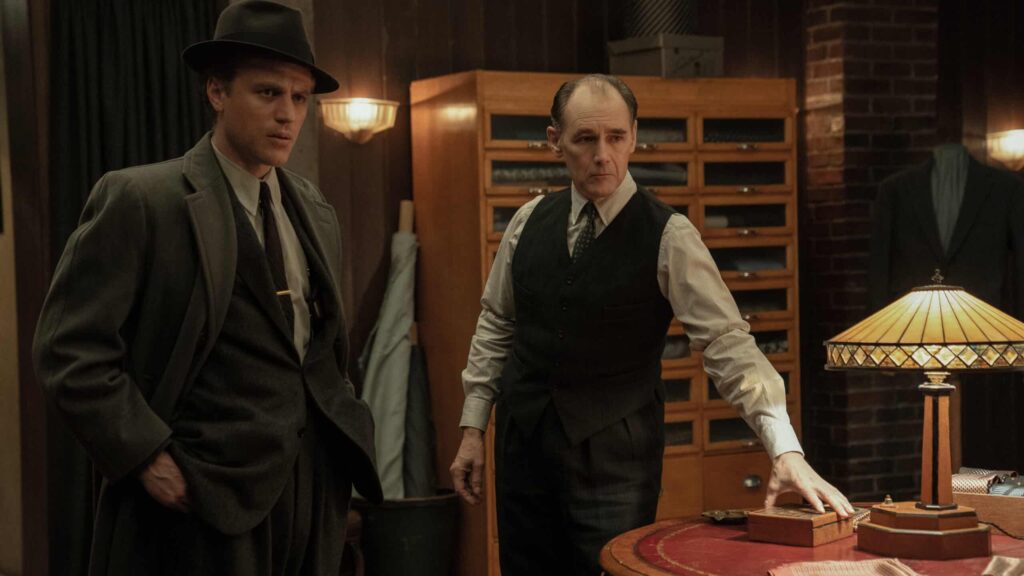
Tension is the key ingredient in The Outfit (aka The Crime Drama), a taut little thriller about mobsters, molls, and menswear. The directorial debut of Graham Moore (writer of The Imitation Game), its story of deception and betrayal isn’t all that far afield from the kinked and kinky narrative of Deep Water. But The Outfit is a more restrained and slippery work, relying on insinuation rather than eruption. Set in a single location—the handsomely appointed shop of a British tailor cutter who’s immigrated to Chicago (he’s credited as Leonard, but everyone affectionately calls him English, and he’s played with sly charm by the great Mark Rylance)—it operates primarily as a dialogue drama, tracking its escalating violence through a series of increasingly fraught and duplicitous conversations.
The substance of those chats can be difficult to follow, as the byzantine screenplay (by Moore and Johnathan McClain) buzzes with names and data; there are dueling syndicates and hidden wiretaps and precious briefcases and ominous envelopes, and everyone on screen is so untrustworthy, you can’t believe a word you’re hearing. This is hardly a problem, because The Outfit’s plotty particulars are less important than its burgeoning suspense. We may not know exactly who everyone is and why certain things are happening, but Moore’s crisp staging lends the murmurded voices a frisson of electricity, most notably during a clever sequence where he cross-cuts between two different tête-à-têtes in which English drops precious morsels of contradictory information. (Moore also supplies English with a seemingly unnecessary voiceover that acquires a late kick.)
Above all, The Outfit functions as a star vehicle for Rylance. Its template may be pleasingly familiar—certain scenes, such as blood dripping from furniture next to the feet of an unsuspecting goon, recall the Wachowskis’ terrific first movie, Bound—but its lead performance still locates new shivers of intelligence and intensity. English is plainly the smartest man in the room, but the brilliance of Rylance’s work lies in how he reverse-bluffs the character into a meek and passive presence, all while he’s constantly pulling the levers. “This isn’t art,” English says when describing the dexterous challenges of his trade. “This is a craft.” Far be it from me to disagree with him, but in Rylance’s wizened hands and twinkly eyes, it looks an awful lot like both.
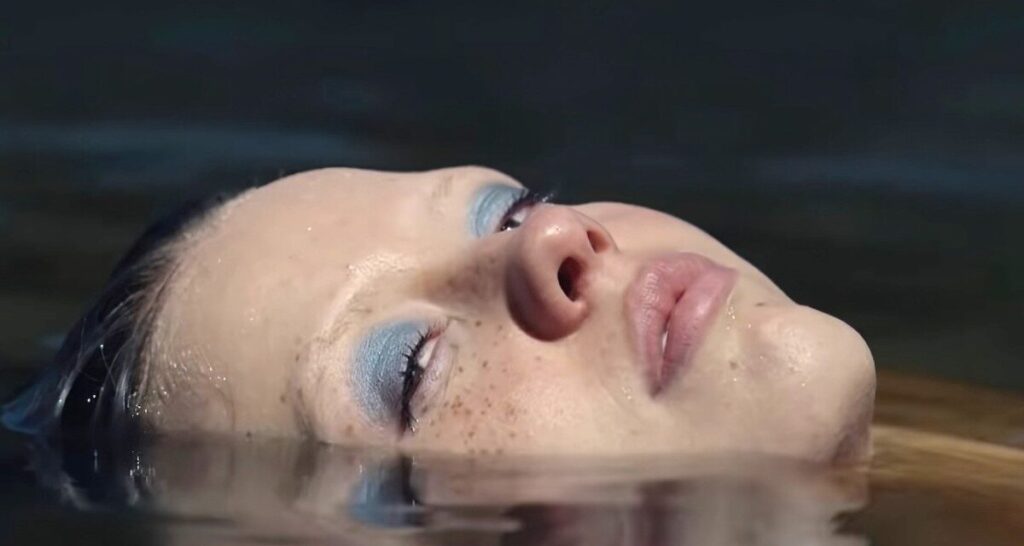
If The Outfit is hushed, withholding, and precise, then X (aka The Sexy Slasher) might seem to be its opposite: loud, swaggering, and splattery. Yet the two films have more in common than they first appear, and not just because they both sport refreshingly original screenplays; they’re also fluid examples of cinematic craft. The work of Ti West, X is a throwback—an unpretentious B picture that features just enough social commentary to elevate it above polished exploitation. Set in 1979, it’s the story of a pornography shoot on a remote Texas farm that suddenly turns into a grisly battle for survival. There may not be any chain saws, but there’s plenty of massacring.
Thematically, X isn’t entirely coherent. It’s arguably preaching about preachiness, mocking the entrenchment of conservative values in an age of female empowerment and sexual liberation. Or maybe it’s just a straightforward slasher flick about hot chicks and muscly dudes being terrorized by a pair of demented senior citizens.
And if that’s all it is, that’s more than enough. As with many horror pictures, X is perhaps more absorbing when it’s slowly building menace as opposed to giddily unleashing mayhem; one magnificent scene, featuring an oblivious swimmer and a keen-eyed alligator, is simply agonizing in its sustained dread. But while West’s past features (most notably The House of the Devil) have emphasized his gift for seeding anticipation, here he proves equally skilled at bloodletting, delivering a handful of set pieces—a man peeking through holes in a barn door, a girl descending a flight of stairs, a woman hiding silently under a bed—that hum with vigor and ingenuity.
He has also given a terrific dual role to Mia Goth, the talented British actor who opens the film by gazing into the mirror and declaring, “You’re a fucking sex symbol!” That isn’t traditionally how I’d describe Goth, who has previously hovered on the margins in movies like Emma, High Life, and Suspiria, improving all of them with her strange angularity. She’s revelatory here, throwing herself into both parts and imbuing them with a delicate combination of curiosity, fear, and desire. Together, she and West illustrate how movies can come alive and take hold of you. The title of X presumably refers to the rating of the naughty nudie its characters are creating, but it also carries a second meaning. In cinema, a great concept is a good start, but in the end, it still comes down to execution.
Grades
The Lost City: B-
Fresh: B
Deep Water: B-
The Outfit: B+
X: B+
Jeremy Beck is the editor-in-chief of MovieManifesto. He watches more movies and television than he probably should.
